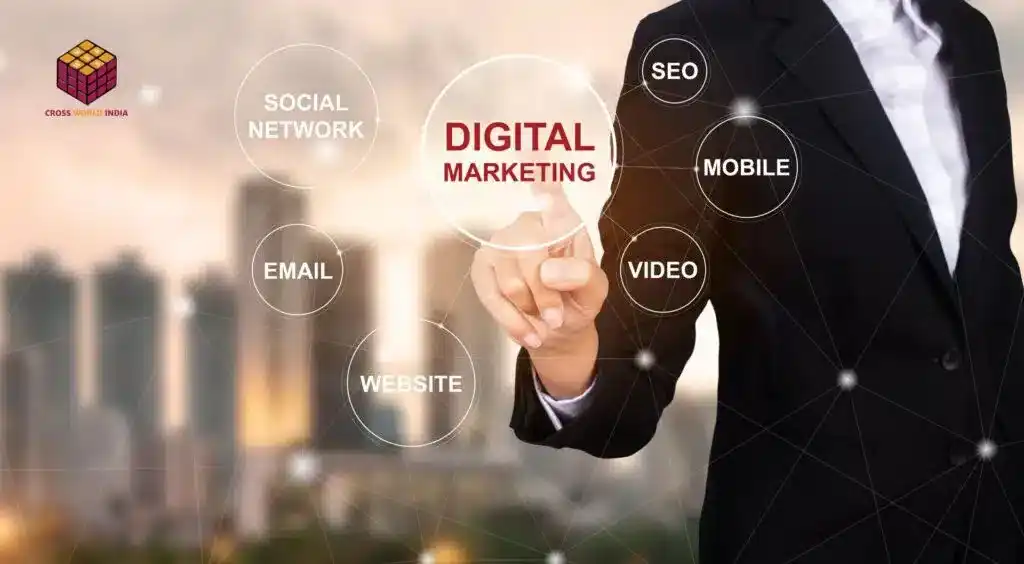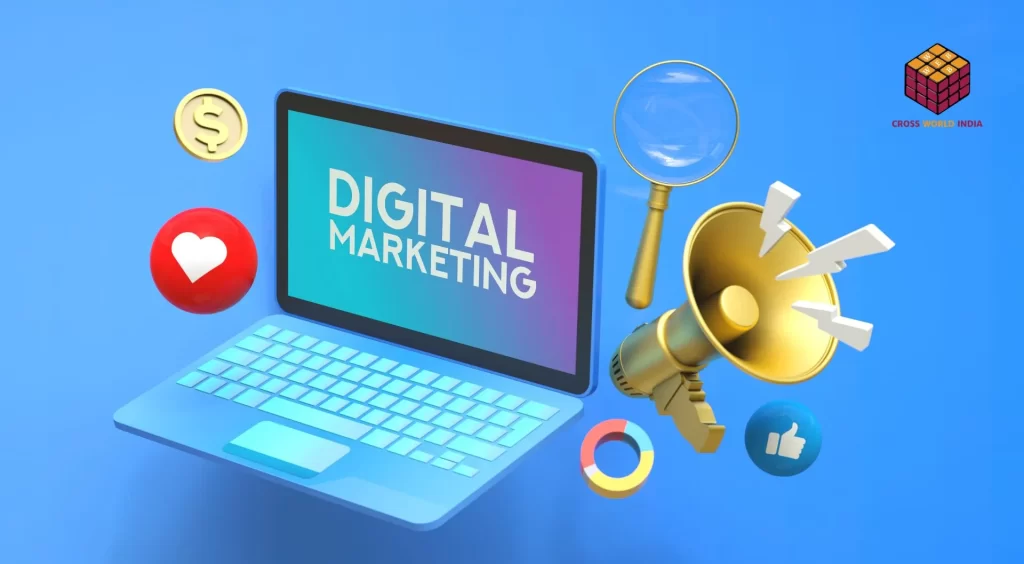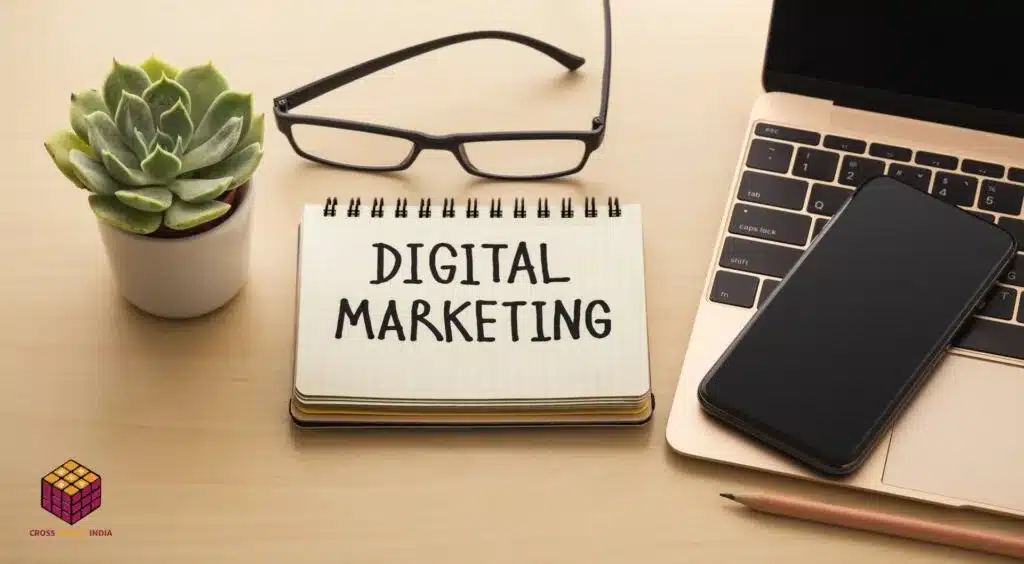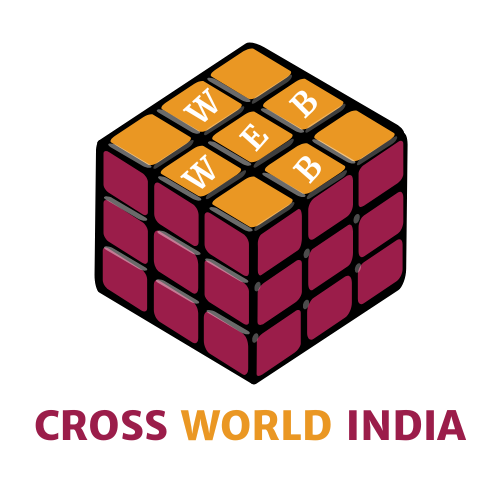Website Designing Company in India
Your one-stop shop for all your digital marketing requirements in India is Crossworld India. We are a group of enthusiastic people committed to assisting companies of all kinds in developing and succeeding online.
Our staff is made up of seasoned experts that have a thorough awareness of the ever changing digital landscape. Search engine optimisation (SEO), social media marketing, pay-per-click (PPC), email marketing, content marketing, and other digital marketing services are among the many areas in which we are experts. Website Designing Company in India


Crossworld India provides individualised solutions that are catered to our clients’ particular needs because we recognise that every business is different. To guarantee that our clients receive the finest outcomes possible, we use the most recent technologies and methodologies as well as a data-driven approach.
Our SEO solutions are made to assist companies in increasing their online presence and positioning on search engines like Google. To guarantee that our clients receive the best results possible, we combine on-page and off-page optimisation strategies.
Our social media marketing services are geared at assisting companies in connecting with their target market and establishing a solid online presence. Facebook, Instagram, Twitter, LinkedIn, and other social media platforms are just a few of the platforms we design and manage social media campaigns for.
Our PPC advertising solutions are made to assist companies in directing targeted traffic to their websites in an effort to increase leads and sales. We design and oversee PPC campaigns on numerous websites, such as Facebook, Bing, and Google Ads.
Our email marketing services are created to assist companies in connecting with their target market and maintaining their interest with pertinent material. To ensure the highest level of engagement and conversions, we design and manage personalised, targeted email campaigns.
Our content marketing services are intended to assist businesses in producing and disseminating information that is interesting, educational, and pertinent to their target market. We produce material and share it across a variety of platforms, including blogs, social media, email, and more.
Crossworld India is dedicated to offering our customers the best possible digital marketing services at affordable costs. We recognise that every organisation has distinct wants and objectives, thus we offer specialised solutions that are made to satisfy their particular needs.
Therefore, Crossworld India is the only firm you need to consider if you’re seeking for a trustworthy and knowledgeable digital marketing company in India. Get in touch with us right away to find out more about our offerings and how we can support the expansion and success of your company online.
What is a Digital Marketing Strategy?
Identifying the precise objectives that can be achieved online is crucial in order to design a digital marketing plan. The efficiency with which a digital marketing strategy is carried out could determine an organization’s success, particularly in a time when more and more individuals conduct business on mobile devices.
The difference between digital marketing and digital strategy must be made. A crucial tool for reaching your objectives and keeping up an online presence is digital marketing. Technology, including cell phones and tablets, keeps us connected all the time, making it easy to pinpoint your target market.
Stages of Digital Marketing Strategy
There are five elements to developing an effective digital marketing strategy that will nurture customers throughout their encounters with your business. A digital marketing strategy consists of five phases: plan, reach, act, convert, and engage.
1. Plan:
Adopt a data-driven strategy, assess the efficacy of current digital marketing, and develop an improvement plan. Metrics and analytics can be customised, and KPI dashboards can be made. Make use of a digital-focused strategy. The digital transformation solutions assist managers and marketers in creating an all-encompassing, data-driven, and useful digital marketing strategy that supports their organization’s overall objective.
2. Reach:
Keep a look out for updates to SERP features and structured data in 2022. Increase site traffic by incorporating the most recent, essential online marketing techniques into your digital marketing strategy. Tracking core changes and EAT (Expertise, Authoritativeness, and Trustworthiness) will help you expand your reach. The keyword approach should be changed to reflect the rise in local voice searches in order to attract local customers.
3. Act:
Encourage interaction on your website or on social media to assist you generate more leads in the future. It’s crucial to impact your target audience’s subsequent sales funnel stages after you’ve identified them.
4. Marketing content:
Throughout the customer lifecycle, strategic content marketing is used to engage, motivate, inform, and persuade potential customers.
5. UX/CX (user experience):
It would be beneficial to have a look at the numerous developments in interaction design and web design that have been demonstrated to improve content engagement and have an impact on user behaviour on your website or social media platforms.
6. Convert:
The ultimate goal of your prepared digital marketing strategy is to convert more customers. Use retargeting, nurturing, and conversion rate optimisation to remind and persuade your audience to buy online or offline if the phone and face-to-face channels are important to you.
7. Engage:
Utilising the web, email, and social media marketing to create hyper-personalized marketing campaigns based on your data about them will improve your tailored communications. The following options are available to modern digital marketers for consumer engagement research and testing:
- A/B testing
- Customer personas
- Customer journey and
- content mapping
- Voice of customer surveys
- Path analysis
- Website customer intent surveys
- Usability studies of digital experiences
- Multivariate testing
Digital Marketing Platforms with Strategies
- Social Media
- Influencer Marketing
- Content Marketing
- Email Marketing
- Search Engine Optimization (SEO)
- Pay-per-click (PPC)
- Affiliate Marketing
- Mobile marketing
- Marketing Automation Platforms
- Marketing Analytics Platforms
1. Social Media Marketing Platforms:
- On average, consumers have about 8 social media accounts.
- The average adult spends an average of 2 hours and 22 minutes on social media per day – that’s almost 2 and a half hours for businesses to interact with and convert consumers every day.
- Out of the 5.11 billion people who have a phone, 3.26 billion access social media using it.
- People spend about 1/7th of their waking time on social platforms.
- 64% of consumers want brands to connect with them on social – this is practically an invitation to interact, and ultimately, convert.
2. Influencer Marketing:
Another effective method for using digital marketing platforms to reach specific audiences is influencer marketing. Brands can collaborate with websites, celebrities, and others who are regarded as experts in their fields and who hold like values. Brands can then communicate with the followers of these influencers by using sponsored content and offers. 90% of marketers reported that influencer marketing was on level with or better than the other channels they use, which shows how successful it has been for many.
In addition, one out of every two women who made a purchase did it on the advice of an influencer. Because nearly half of social media users believe brand recommendations from influencers, influencer marketing has the potential to be a very effective technique for growing engagement and revenue for your business.
3. Email Marketing:
Personalised newsletters or offers can be sent to customers via email marketing campaigns depending on their past purchasing history or level of brand engagement. If a person has interacted with a few of your brand’s touchpoints, a simple extra incentive could easily tip the scales from a “abandoned cart” to a completed purchase, such as an email offer for 10% off the items they have been considering or free shipping.
Nearly 60% of consumers say email influences their purchasing decisions. Additionally, subscribers are more likely to open transactional emails than other sorts of emails. Transactional emails are emails that help a customer complete a transaction or reset a login.
4. Content Marketing:
Marketing teams can be proactive about informing customers about new and existing products in a relaxed, unhurried manner and about responding to their users’ questions by using content marketing. The written material, videos, and other marketing assets that digital marketing teams create address the three phases of the buyer’s journey.
The awareness stage: Buyer realizes they have a need
The consideration stage: Buyer determines a course of action to meet this need
The decision stage: Buyer decides on a product / service to purchase to meet the need
5. Search Engine Optimization (SEO) Marketing:
Search engine optimisation, also known as “SEO,” and content marketing regularly collaborate. The manner that material is produced and put online by the business for their website, blog, or other digital marketing platforms can increase the likelihood that potential customers will notice it compared to how similar content is written and placed online by their competitors. This writing and posting strategy, together with all the methods and factors it comprises, is referred to as “search engine optimisation” since the client is utilising a search engine, such as Google, to find information about a good or service.
When done correctly, SEO can be a very effective part of a company’s marketing strategy. In fact, 53% of consumers assert that they research potential purchases using search engines before making a choice, and 51% of smartphone users assert that they have discovered a new product or service by using a search engine on their devices.
6. Pay-per-click (PPC):
A form of compensated promotion known as pay-per-click (PPC) advertising enables marketing teams to essentially “buy” website traffic. Advertisements are placed by marketers on websites or search engines like Google and Microsoft Bing for a fee for each click. While search engine results pages (SERPs) banner advertising generally appear at the top and are typically determined by bids on specific keywords, banner ads on websites normally have predefined costs.
The potential consumer might have just as easily clicked on the firm’s ad on the first page of Google instead of its blog and bought the shoes directly if the shoe company had been utilising a PPC ad campaign as a part of their digital marketing plan. Let’s take the purchase of athletic shoes by a consumer as an example.
7. Affiliate Marketing:
Affiliate marketing involves cooperating with other people or companies on the promotion of your product in exchange for a share of the sales that can be attributed to their efforts, much like referral programmes. This is a way to cut costs and outsource some of the labor-intensive components of advertising, but you’re giving someone else the responsibility for managing your company’s reputation, so this type of marketing frequently requires more rigorous monitoring and surveillance.
8. Mobile Marketing:
Mobile marketing efforts, which often include text messages, social media, email, push notifications, and mobile applications, can make use of many of the digital marketing strategies that were previously described. The importance of mobile marketing is anticipated to grow as the number of mobile shoppers rises to an estimated 187.5 million users by 2024. Given the evident move towards mobile, digital marketers must think about how to modify their current marketing strategies for mobile in order to deliver a seamless and user-friendly experience.
9. Marketing Automation Platforms:
The adoption of marketing automation solutions can be quite advantageous for any digital marketing plan. Like so many other digital marketing strategies, marketing automation may be “stacked” on top of current digital marketing platforms to enhance and enhance their effects.
The best way to describe marketing automation platforms is as computer programmes that can perform routine marketing duties on behalf of a business without the assistance of a human being. The capacity of marketing automation platforms to “run” specific components of a company’s marketing strategy without the need for more people or greater payroll expenditures is a significant benefit.
10. Marketing Analytics Platforms:
Businesses can gather and analyse data from their digital marketing initiatives using marketing analytics tools to determine how successful those projects have been, what ROI they can expect from them, and what can be done to increase future marketing income.
A report card is helpful to a student, just as marketing analytics tools are helpful to businesses as you can’t better your future digital marketing efforts if you don’t know the outcomes of your current efforts. In fact, 21% of organisations believe that adopting marketing analytics is the greatest way to obtain and maintain a competitive edge over other companies.
How to Create a Social Media Marketing Strategy?
Define Your Objectives:
The first step in creating a social media marketing strategy is to define your objectives. What do you want to achieve with your social media marketing?
Do you want to increase brand awareness, generate leads, drive traffic to your website, or something else? Once you know what you want to achieve, you can start developing a strategy to achieve those objectives.

Identify Your Target Audience:
The next step is to identify your target audience. Who are you trying to reach with your social media marketing? What are their interests, needs, and preferences? Understanding your target audience will help you create content that resonates with them and engages them.
Choose the Right Social Media Platforms:
Not all social media platforms are created equal. You need to choose the right platforms based on your objectives and target audience.
For example, if you’re targeting a younger audience, you might want to focus on platforms like TikTok and Snapchat, whereas if you’re targeting professionals, LinkedIn might be a better option.
Develop a Content Strategy:
Once you know your objectives, target audience, and social media platforms, it’s time to develop a content strategy. What type of content do you want to create? How often do you want to post? What tone do you want to use? Your content should be tailored to your target audience and should align with your overall objectives.
Monitor and Analyze Your Results:
Finally, it’s important to monitor and analyze your results. This will help you understand what’s working and what’s not, so you can make adjustments to your strategy as needed. Use tools like Google Analytics and social media analytics to track your results and make data-driven decisions.


Thank you for visiting Crossworld India, your one-stop shop for all your digital marketing requirements in India. We are a group of driven professionals committed to assisting companies of all kinds in expanding and succeeding in the digital sphere.
Our team is made up of seasoned individuals with in-depth knowledge of the rapidly changing digital landscape. We have a broad range of expertise in digital marketing services, such as search engine optimisation (SEO), social media marketing, pay-per-click (PPC), email marketing, content marketing, and more.
Since every company is different, we at Crossworld India offer specialised solutions that are designed to satisfy the particular requirements of our customers. To ensure that our clients receive the finest outcomes possible, we use a data-driven strategy and the most up-to-date tools and methods.
With the aid of our SEO services, businesses may increase their online visibility and gain a higher ranking on search engines like Google. In order to give our clients the greatest results, we combine on-page and off-page optimisation strategies.
